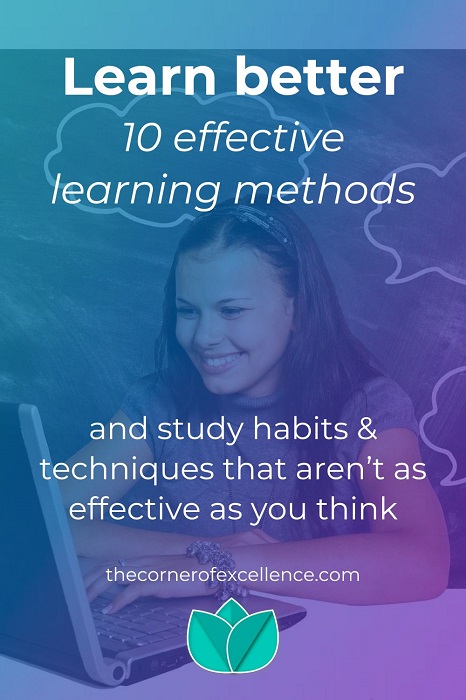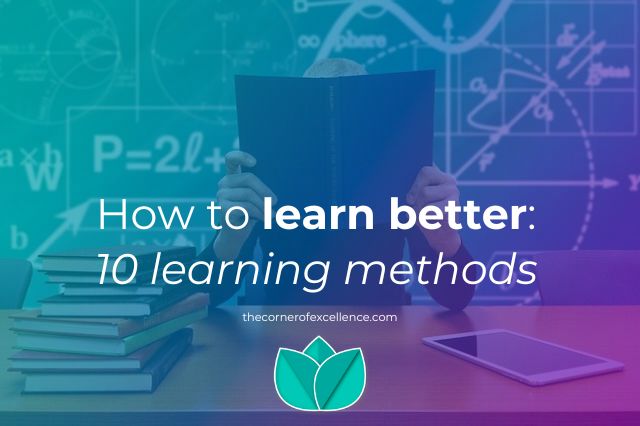Learning does not end when we finish school. If we want to continue developing on a personal and professional level, we will continue learning throughout our lives. There are infinite topics to learn about through formal and informal training. But how many of us learned at school how to learn? How many were taught effective learning methods?
The benefit of learning better
Maybe you think, well I have managed to pass all the exams I have faced. I have managed to finish the courses I have taken. But how much do you remember of what you studied?
Sadly it seems that they teach us to study to pass exams and get degrees; not to remember what we learned. But withholding information is what makes it useful for our lives, be it on personal or professional level. It allows us to take advantage of it to solve problems. It helps us find solutions.
Being able to put what you have learned into practice should be the ultimate goal, right? So let us see how you can learn better so that what you study is really useful to you.
Bad learning practices
Although they may seem obvious, I want to start with some habits that harm your learning.
Not sleeping well
To perform well, quality sleep is basic. We can apply that to work, study and exam preparation. With fatigue, toxins accumulate in our brain that alter the neural connections that allow us to think well and fast.
Sleeping well allows our bodies to recover from the efforts of the day. It also allows our brain to assimilate events and learnings. Quality sleep is key to our well-being and health.
Before an important event such as an exam, it becomes even more important. If you have not slept enough, you will spoil all previous learning effort.
Getting distracted
Distractions are the biggest enemy of concentration. Be it your cell phone, television, interruptions by other people … every time you lose focus it takes a few minutes to regain concentration.
When studying in a group, these distractions can be superfluous chats not related to the subject of study.
Also, you may wonder if studying with music is considered a distraction because you like doing it. It depends. If you choose songs that you end up humming along, they will have been a bad choice. If you like studying with background music, I suggest opting for instrumental music without lyrics. On the internet you can find music to concentrate, study and work that is usually classical or jazz music for example.
In short, every time you let yourself be distracted you lose valuable time. So try to limit distractions to a minimum.
Procrastinating until the last minute
It seems that we work better under pressure. When the deadline is upon us, suddenly we tackle a task, that seemed to take a long time, faster. But in case of learning this is not the best way. Because we do not give our brain time to internalise the subject matter well. We do not allow it to create the neural connections that fix memory and understanding well.
Maybe you will say, but I managed to pass that exam for which I studied at the last minute. Perhaps. But how much do you remember about the matter later? The question is if you study only to pass an exam or really want to assimilate the subject.
If the latter is the case, you had better not leave studying for the last minute. Would you prepare for a race only the day before? The brain works like your muscles. The muscles can only assimilate a limited amount of exercise. Then they need to recover before you continue training them.
In the same way, your brain can only assimilate a limited amount of information at a time. You need time to transfer what you have learned from short-term memory to long-term memory.
Learning methods that are not as effective as you think
There are methods that many of us use. But in reality they are not as effective for learning as we think. Let us look at three examples of typical but ineffective study habits.
Passively reading the content
Reading the subject matter several times helps learning. But only if we check what we remember from what we read. If we simply repeatedly read passively, learning is ineffective.
Highlighting text
Highlighting or underlining key words or phrases is a very common technique. But has it ever happened to you that you end up with almost all the text marked? This learning technique can be useful. But only if you really just highlight key concepts and make sure you remember them.
Memorising the solution to a problem
Reading the solution to a problem and memorising it is not enough for learning. If we want to internalise the solution to a problem, we must understand the way towards it.
How to learn better: 10 effective methods
So let us see what will help you learn and retain information better. After all, we are supposed to study not only to pass some exam but to assimilate and comprehend the subject-matter. In this way we can make use of it when we need it.
1. Gain an overview
Before starting to study the subject-matter, get an overview of what you are going to learn. To do this, check the course or textbook index. It will give you an idea of the different topics that await you.
Then, before reading a chapter you are going to study in detail, glance over it. This will give you a general idea of what makes up the subject of the chapter.
2. Try to remember
After reading a chapter or section, try to remember the content. What have you managed to retain? This is much more effective for learning than simply reading the content and taking notes.
Once you have checked what you can remember, read the section again. Then repeat the attempt to remember.
3. Test yourself
In addition to trying to remember what you have studied, testing yourself is one of the most effective methods to check your learning level. Depending on what you are studying you will have tests at your disposal. If not, think of a way to check your knowledge.
It may be a matter of making up questions and developing the answers. Maybe you can explain the subject-matter to someone. This is a very good way to check if you really understand it. Albert Einstein already said it: “If you cannot explain it simply, you do not understand it well enough.”
4. Understand the way to the solution
Keeping an inquisitive mind is key to learning. To retain what you have studied and really understand it, it is not enough to memorise the problem and its solution. You need to understand how the solution is reached. Why the solution is that and not another? Challenge what you are studying. Why is this so? Why does it make sense?
Ask the teacher or tutor for an explanation if you do not understand something. Let them clarify it again or explain it in a different way.
5. Space the repetitions
In the beginning I told you that waiting until the last minute to study is not the best method. Repeating the subject of study several times helps us to retain it better. Studying a little each day is more effective than a binge of studying for several hours one day a week.
Once you are assimilating the subject-matter, it is useful to allow more time to pass between the repetitions of a specific subject. In this way, what you study will be anchored in your long-term memory. For example you can start by repeating two different topics on alternate days. Then alternate between three topics so that you repeat each one every three days. And so on.
6. Take breaks
Our brain can only focus for a limited time. To anchor what you have learned in memory you need to rest. When we are not studying in a concentrated way, that is, in focused mode, our subconscious continues to work.
Has it ever happened to you that you try to remember something but cannot? Or you are trying to solve a problem but cannot find the solution? Then you stop thinking about it and do something else. And suddenly what you did not remember or the solution to the problem come to mind. Well that is the subconscious working in diffuse mode.
Throughout history we have several examples of “eureka” moments that occurred in diffuse mode. Archimedes, taking a bath, came up with how to calculate volume and density. The apple that fell from a tree, under which he was sitting, gave Newton the idea for the laws of gravity.
Therefore taking breaks is necessary to learn better and fix memories. It also helps your creativity and problem-solving skills.
7. Separate memory from place
In addition to spacing repetitions, studying and remembering in different places also helps you learn better. We usually study in the same place. So our brain usually associates what we have learned with that place. Then when we go blank during an exam due to nerves we often imagine ourselves in the place where we studied to try and remember the subject.
But we can reduce the chances of a mental block under pressure. If we disassociate learning from a specific place we will be better able to remember what we have learned anywhere. So study a specific subject, try to remember it and test yourself in different places.
8. Start with the difficult
As mentioned before, our brain has a limited ability to concentrate. So it is advisable to start studying the most difficult first. When you start learning, first choose the subject that is most complicated for you.
9. Create good study habits
Making learning a habit is the best trick to avoid procrastination. But creating new habits can be difficult for us. So remember that a habit is made up of cue, desire, response, and reward. Find a way to create stimuli, i.e. a cue, to want to study. Reward yourself after a study session.
10. Avoid procrastination
It is very easy to get distracted and dedicate ourselves to something else that seems more fun. But remember that you will feel satisfied and grateful when you have spent some time studying. It is gratifying to know that you have been productive. To fight procrastination you can help yourself in several ways.
On the one hand, set a specific time for studying. Then create a to-do list of what you want to study. Crossing off what you have done is gratifying. It will also help your subconscious to assimilate what there is left to do.
On the other hand, focus on the study process instead of the result. This takes the pressure and stress out of achieving a certain goal. Let your goal simply be making progress. Studying with the Pomodoro technique can help you focus without distraction for a while.
Will these tips help you learn better?
Did you know the good and not so good methods for studying? What other techniques do you use when learning?
If you want to learn how to learn better, I also recommend the course “Learning how to learn” on Coursera. It gives you many more tricks for more effective learning.

Sharing is caring!





2 responses
#7 is new to me. I never thought of using different places to learn for better retention. Very interesting.
Hi Chris! When I learned this trick I remembered my A-Levels when I went completely blank in the history exam. Knowing this would have helped me back then to consolidate the memory of what I had studied.